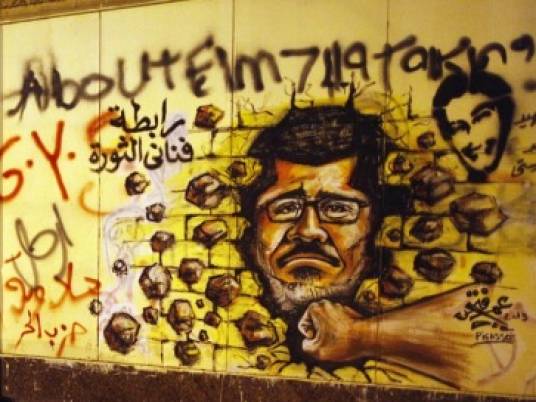
Egypt's opposition Monday gave Islamist Mohamed Morsy a day to quit or face civil disobedience after deadly protests demanded the country's first democratically elected president step down after just a year in office.
"We give Mohamed Morsy until 5:00 pm (1500 GMT) on Tuesday July 2 to leave power, allowing state institutions to prepare for early presidential elections," the Tamarod movement said in a statement on its website.
Otherwise, "Tuesday, 5:00 pm will be the beginning of a complete civil disobedience campaign."
Tamarod — Arabic for Rebellion — is a grassroots campaign which says it collected more than 22 million signatures declaring a lack of confidence in Morsy.
It was behind Sunday's protests that saw millions of people take to the streets demanding his departure on the first anniversary of his inauguration as president.
As Morsy stood firm and insisted the only way out of the political crisis was dialogue, calls for army intervention increased.
Tamarod's statement urged state institutions to stand side by side with the protesters.
It urged "the army, the police and the judiciary to clearly side with the popular will as represented by the crowds".
Opposition leader Hamdeen Sabbahi called for military intervention if Morsy refused to quit.
"The armed forces must act, because they have always been on the side of the people" which "has expressed its will", said Sabbahi, who came third in the 2012 presidential election.
The best outcome would be for Morsy to go willingly, he added.
But Morsy's spokesman Ehab Fahmy told reporters: "Dialogue is the only way through which we can reach an understanding… The presidency is open to a real and serious national dialogue."
Five people were killed when in clashes late on Sunday and another person died overnight from injuries, a health ministry official said.
Some protesters attacked the Cairo headquarters of the Muslim Brotherhood, from which Morsy hails.
Television pictures showed the building ablaze as dozens of people threw fire bombs and stones.
Brotherhood supporters fired buckshot in a bid to repel the attackers, an AFP journalist said. Later, automatic weapons fire was heard around the building.
Hundreds of demonstrators spent the night in Cairo's iconic protest site Tahrir Square and outside the presidential palace, after the army estimated that millions had heeded the opposition call to protest.
Sunday's turnout — on the first anniversary of Morsy's inauguration — was described as the largest ever protest in the country's history.
"Long live the people," read Monday's headline in the independent daily al-Tahrir, while Al-Masry Al-Youm labelled Sunday's protests the "June 30 revolution".
Anti-Morsy protests were held in the coastal city of Alexandria, the Nile Delta cities of Mansoura, Menuf, Tanta and Mahalla, the canal cities of Suez and Port Said and in the president's hometown of Zagazig.
In Tahrir Square, protesters brandished red cards and Egyptian flags as patriotic songs played.
"The people want the ouster of the regime," they chanted, echoing the signature slogan of the 2011 revolt that ousted Hosni Mubarak and eventually brought Morsy to power.
His supporters have staged counter rallies to defend his legitimacy and there had been fears of major confrontations.
But Sunday's anti-government protests eclipsed the loyalists' gathering in Cairo's Nasr City neighbourhood, which the army estimated attracted some 25,000 people.
Police and troops had deployed at key buildings nationwide, including at vital Suez Canal installations, security officials said.
Hospitals also went on high alert as banks and most offices closed on Sunday, a working day in Egypt.
Last week, eight people including an American were killed and scores were injured as rival demonstrators clashed.
Morsy, previously a senior Brotherhood leader, is Egypt's first freely elected president, catapulted to power by the uprising that ended three decades of Mubarak rule.
His opponents accuse him of betraying the revolution by concentrating power in Islamist hands and of sending the economy into freefall.
Morsy supporters say he inherited many problems from a corrupt regime, and that he should be allowed to complete his term which ends in 2016.
Any attempt to remove him would be a coup against democracy, they say.
Opponents insist calls for his resignation are aimed at restoring the revolution's cornerstones of democracy, freedom and social justice.
The army, which led a tumultuous transition after Mubarak, had warned it would intervene if there was major unrest.
Since taking office, Morsy has battled with the judiciary, the media and the police.
Egypt's economy has nosedived, investment dried up, inflation soared and the vital tourism sector been badly battered.




